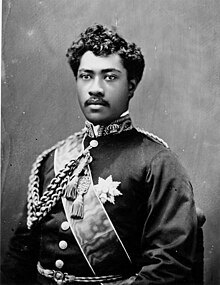
Back ليليوهوكو اى ARZ William Pitt Leleiôhoku Danish Leleiohoku II Spanish Leleiohoku II Finnish Leleiohoku II French Leleiohoku II ID
| Leleiohoku II | |||||
|---|---|---|---|---|---|
| Prince of the Hawaiian Islands | |||||
 Prince Leleiohoku, in military uniform, wearing the Royal Order of Kamehameha I, photograph by Menzies Dickson, c. 1874 | |||||
| Regent of the Kingdom of Hawaii | |||||
| Tenure | November 17, 1874 – February 15, 1875 | ||||
| Monarch | Kalākaua | ||||
| Born | January 10, 1855 Honolulu, Oʻahu, | ||||
| Died | April 9, 1877 (aged 22) ʻIolani Palace, Honolulu, Oʻahu, | ||||
| Burial | April 25, 1877[1] | ||||
| |||||
| House | House of Kalākaua | ||||
| Father | Caesar Kaluaiku Kapaʻakea | ||||
| Mother | Analea Keohokālole Ruth Keʻelikōlani (hānai) | ||||
| Religion | Church of Hawaii[2] | ||||
| Signature | |||||
William Pitt Leleiohoku II, born Kalahoʻolewa (January 10, 1855 – April 9, 1877), was a prince of the Hawaiian Kingdom and member of the reigning House of Kalākaua.
At birth, Leleiohoku was hānai (informally adopted) by Ruth Keʻelikōlani and later legally adopted by her in 1862 as the heir to her vast land holdings. He was educated at St. Alban's College, a precursor of the present ʻIolani School. After finishing his education, he worked in the governmental Foreign Office and served as an officer on the personal military staff of King Lunalilo. On February 14, 1874, his brother Kalākaua was elected king after the death of Lunalilo. Declared heir apparent to his childless brother, Leleiohoku was expected to inherit the throne of Hawaii. He also served as a Privy Councilor and member of the House of Nobles in the Legislature of the Kingdom of Hawaii.
During Kalākaua's trip to the United States to negotiate the Reciprocity Treaty of 1875, Leleiohoku ruled as regent from November 17, 1874, to February 15, 1875. He died at the age of 22 from rheumatic fever resulting in the proclamation of his sister Liliʻuokalani as the next heir to the throne. Leleiohoku and his siblings are honored by the Hawaiian Music Hall of Fame as Na Lani ʻEhā (The Heavenly Four) for their patronage and enrichment of Hawaii's musical culture and history. An accomplished musical composer, Leleiohoku is remembered for composing many folk songs including "Kāua I Ka Huahuaʻi", which was adapted into the popular American song "Hawaiian War Chant".
- ^ Forbes 2001, p. 642.
- ^ Kam 2017, p. 102.